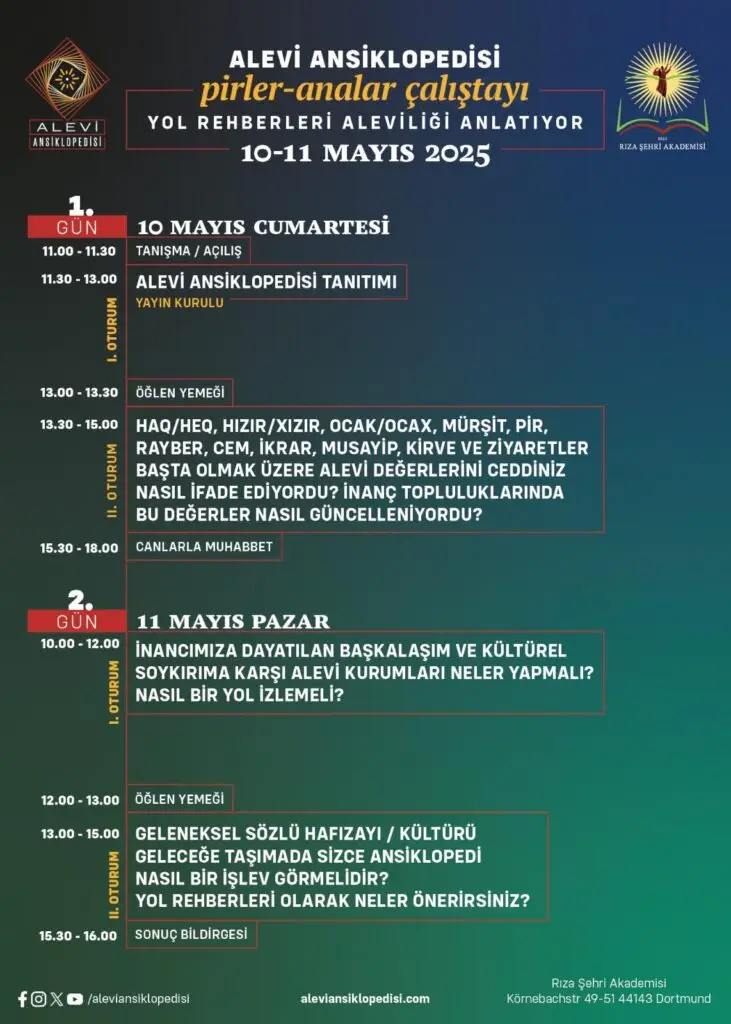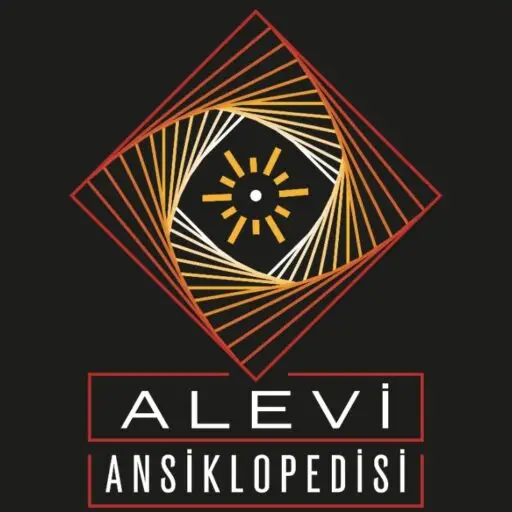First Pirler–Analar Workshop (Spiritual Guides Speak on Alevism) 10–11 May 2025, Dortmund (DAKME e.V.)
Throughout the event, Editorial Board members Dr. Ahmet Kerim Gültekin and Dr. Hayal Hanoğlu conducted in-depth conversations with participating Pirler and Analar. These video recordings have since been processed and published as one of the Encyclopedia’s most distinctive sections, “In the Words of the Spiritual Guides.” This initiative, particularly the recordings on Alevi theology and cosmology, has drawn strong attention within the Alevi public sphere, highlighting the importance of oral tradition in preserving and transmitting the community’s knowledge.
Sessions and Key Themes
Day One – 10 May 2025
The first day opened with an introduction to the Alevi Encyclopedia (11:30–13:00), where the editorial board presented the project’s scope, goals, and progress to date. The second session (13:30–15:00) explored the theme “Alevi Concepts and Their Possibilities for Renewal,” addressing how core notions such as Haq/Heq, Xızır, Ocak, Mürşit, Pir, Rayber, Cem, Ikrar, Musahiplik, Kirvelik, and pilgrimage traditions have been expressed historically and how they might be adapted to contemporary contexts. The day concluded with “Muhabbet with the Community” (15:30–18:00), a free-flowing dialogue between the spiritual guides and participants.
Day Two – 11 May 2025
The second day began with the session “Assimilation and Institutional Stance” (10:00–12:00), where participants discussed the long history of imposed transformation, cultural erasure, and forced assimilation, and how Alevi institutions should respond. The afternoon session (13:00–15:00) focused on “Oral Memory and the Encyclopedia’s Role,” examining how the Encyclopedia can preserve oral traditions for future generations. The workshop concluded with a Joint Declaration (15:30–16:00), summarizing collective proposals and contributions.
Preserving and Renewing Ancient Concepts
One of the central discussions of the workshop was the need to preserve and reinterpret the ancient concepts of the Raa Haqi cosmology in contemporary contexts. Pirler and Analar debated how notions transmitted for centuries through oral tradition—such as ikrar (sacred vow), musahiplik (companionship), sır (secret), rehberlik (guidance), and Xızır—can be made meaningful in today’s social realities. These are not only theological and historical categories, but also ethical, ecological, and social cornerstones. The workshop emphasized safeguarding these concepts while rearticulating them in a language accessible to younger generations, ensuring the continuity of collective memory.
Institutional Responses to Assimilation and Cultural Erasure
Another major theme was the long-standing pressures of assimilation, discrimination, and cultural erasure that Alevi communities have endured—from Ottoman times to the Republican era, from forced displacements to the 1938 Dersim massacre, and up to today’s compulsory religious education. Participants highlighted the urgent need for Alevi institutions to develop strategies of resistance rooted in this historical experience. The workshop stressed that such solidarity should not remain inward-looking, but must extend to alliances with neighboring ancient communities—Êzidîs, Yaresanis, Nusayris, and others—who share parallel histories of exclusion and survival.
Transmitting Oral Memory into Written and Digital Platforms
The third focal point was the transmission of Pirler and Analar’s wisdom into both written and digital forms. Oral memory in Dersim and across the diaspora is more than a collection of individual experiences; it carries the unique epistemology of Alevi cosmology—its Zahir/Batın distinctions, jiare (sacred place) beliefs, the perception of sacred land, and the relationship between humans and nature. The workshop underscored the necessity of systematically archiving this heritage through the Alevi Encyclopedia, making it accessible in multiple languages, and turning it into a reliable resource for both researchers and future generations. In this way, knowledge at risk of being lost can be safeguarded, revitalized, and kept alive through modern technologies—affirming one of the Encyclopedia’s most vital missions.
In the Words of the Spiritual Guides: Digitizing Oral Memory
During the workshop, members of the Alevi Encyclopedia’s founding editorial board, Dr. Ahmet Kerim Gültekin and Dr. Hayal Hanoğlu, conducted in-depth conversations with participating Pirler and Analar. These sessions were not simply recordings; they became a unique oral archive that carries the essential concepts, ritual knowledge, theology, and cosmology of the Alevi faith directly in the words of its spiritual leaders. Carefully processed, these recordings have been published as one of the Encyclopedia’s most distinctive sections, “In the Words of the Spiritual Guides.”
This section marks a major milestone in the preservation and transmission of Alevi knowledge. Oral memory, which has always been the primary vehicle for passing on Alevi traditions, is here transformed into a permanent digital archive. By capturing concepts and rituals as living practices and lived experiences—not just as historical data—the Encyclopedia ensures that knowledge is conveyed authentically, from within the community’s own conceptual world. Unlike conventional academic approaches, this method records Alevism in its own language, categories, and worldview, not through external observers’ interpretations.
A further hallmark of this initiative is its multilingual character. The recordings are not only in Turkish but also in Kurmancî and Kırmanckî, giving direct voice to the linguistic richness of Alevi communities. This enables the Encyclopedia to reach not only the academic world but also younger generations in the diaspora and local communities. By revitalizing endangered languages, the project contributes to safeguarding both the cultural and linguistic diversity of Alevism.
The launch of this section has generated significant interest in the Alevi public sphere. Especially the video recordings on Alevi theology and cosmology have sparked lively discussions, both within communities and in academic circles. “In the Words of the Spiritual Guides” underscores that the Alevi Encyclopedia is not just a repository of written academic entries, but also a living, multilingual, and pluralistic memory space that digitizes oral heritage.
Conclusions
The First Pirler–Analar Workshop demonstrated that the Alevi Encyclopedia is far more than a digital publishing project: it is a collective, participatory archive of living memory rooted in direct dialogue with the carriers of the faith. The event showed that knowledge production within the Encyclopedia is not confined to textual or scholarly sources but is deeply grounded in the oral wisdom, concepts, and experiences transmitted across generations by Pirler and Analar.
The discussions throughout the workshop reinforced the Encyclopedia’s inclusive and pluralistic vision of knowledge. The diverse interpretations of concepts, rituals, and theological insights brought by spiritual guides highlighted that the project is not an external academic endeavor, but rather a platform nourished by the community’s own voices and perspectives. This ensures that Alevi knowledge can be transmitted free from external categorizations and homogenizing frameworks, carried forward in its authentic and multifaceted forms.
At the same time, the workshop stressed the necessity of digitizing oral culture. When the knowledge conveyed by Pirler and Analar is systematically archived and made available in multiple languages, it not only strengthens the community’s capacity to safeguard its memory but also creates a reliable resource for researchers and future generations. In this way, the Encyclopedia is positioned not only as a guardian of the past but also as a dynamic cultural memory space that embraces present diversity and anticipates future needs.
In sum, the First Pirler–Analar Workshop stands as one of the most significant milestones in the Alevi Encyclopedia’s journey. It marked the project’s commitment to producing and transmitting Alevi knowledge through its own concepts, plural structures, and the tools of the digital age. More than a scientific resource, the Encyclopedia is emerging as a project shaped by the resilience of collective memory, the inner language of belief, and the strength of communal solidarity.


